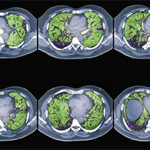What Rheumatologists Need to Know
The summit underscored the recognition that practicing clinicians continue to struggle with in this arena because there are no good answers at this time. “Patients who have RA with ILD need better treatment for their ILD. Patients with scleroderma and ILD need better approaches to screening, management and therapy for their ILD. I look at this as a platform that’s been put forth with regards to unmet clinical and research needs and opportunities,” Dr. Fischer says.
A major takeaway from the summit was the emphasis to learn from idiopathic pulmonary fibrosis—both failures and successes with clinical trials, clinical trial design and implementation. “We have rare diseases,” Dr. Fischer says, “but with coordinated efforts, we can really put novel therapeutic agents into clinical trials and successfully recruit, enroll, design and foster clinical trials. So on a practical level, we hope to be able to see that the treatment paradigm for ILD is enriched by successfully conducted clinical trials.”
The summit was an indication of both the need for answers for patients with CTD-associated ILD as well as a high level of enthusiasm among clinicians and researchers who flew in from around the world in order to share information and collaborate.
“The enthusiasm for the effort leading up to this meeting and the work put in by the attendees, I think, speaks to an era of excitement and optimism that these kinds of efforts will lead to getting us the answers that we desperately need to help these patients,” Dr. Fischer says. “By getting different clinicians and researchers from across different specialties to interact and meet face to face, it really does foster future collaborative opportunities.”
Renée Bacher is a frequent contributor to ENT Today and the AARP Bulletin. Her article about heart disease in women, “This Story Could Save Your Life,” won a recent National Health Information Award for Family Circle magazine.
Reference
- Fischer A, Strek ME, Cottin V, et al. Proceedings of the American College of Rheumatology/Association of Physicians of Great Britain and Ireland Connective Tissue Disease-Associated Interstitial Lung Disease Summit: A multidisciplinary approach to address challenges and opportunities. Arthritis Rheumatol. 2019 Feb;71(2):182–195.

